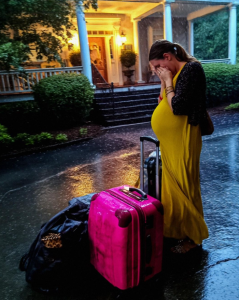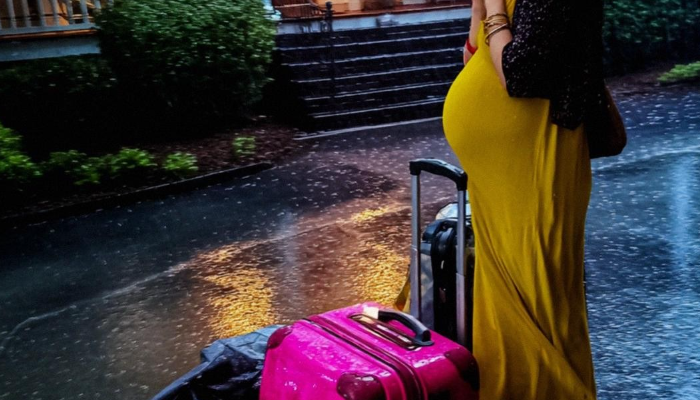“The Pink Suitcase”
It was still raining when I stepped off the porch, my pink suitcase thudding against the wet concrete. I had 36 hours to leave. That’s what my stepmother, Denise, had said—coldly, precisely, like she was reading from a script.
Dad had been buried less than a day ago.
I stood there, soaked and stunned, watching the house I’d grown up in blur behind a curtain of rain. The porch light glowed like a lighthouse I was no longer welcome to approach. Denise had changed the locks that morning. Her adult son, Travis, had helped. He didn’t look at me once.
I was 24. Not a child. Not helpless. But grief makes you small. And betrayal makes you invisible.
Denise had married my father five years ago, after my mother died. She was polished, efficient, and always smelled like citrus and control. Dad had loved her, I think. Or maybe he’d just needed someone to keep the house from falling apart while he fell apart himself.
In the final months, when cancer hollowed him out, I moved back in. I cooked, cleaned, held his hand through the night. Denise was there, too—but distant. She managed the hospice paperwork, the insurance calls, the funeral arrangements. She never cried.
After the funeral, I thought we’d have a moment. A shared silence. A nod of mutual loss.
Instead, she handed me a manila envelope.
“Your father didn’t leave the house to you,” she said. “I need you out by Monday.”
I stared at her. “He said I could stay. He told me—”
“He didn’t put it in writing,” she said. “And I’m not obligated to honor promises made on morphine.”
I didn’t scream. I didn’t beg. I just packed.
The pink suitcase was a gift from Dad when I graduated college. “For all the places you’ll go,” he’d said. I never imagined one of those places would be the curb outside his house.
I sat on the suitcase, rain soaking through my jeans, and tried to breathe.
That’s when Mrs. Ellison appeared.
She was our neighbor, 82 years old, with a spine like a question mark and a heart like a cathedral. She’d baked cinnamon rolls for Dad every Sunday until he couldn’t chew anymore.
She walked toward me with an umbrella and a thermos.
“I saw her throw you out,” she said. “And I saw what she didn’t see.”
I looked up. “What do you mean?”
Mrs. Ellison handed me the thermos. “Your father left something behind. Something she didn’t find.”
She led me back to her house, where the kitchen smelled like nutmeg and memory. She pulled out a shoebox from under the sink.
“He gave this to me two weeks before he passed,” she said. “Told me to keep it safe until the funeral was over.”
Inside was a letter. And a key.
The letter was handwritten, shaky but clear:
“To my daughter, If Denise tries to push you out, know this: the house may be hers, but the land is mine. I bought it before I met her. The deed is separate. I’ve left it to you. The key opens the safety deposit box at First National. Inside is the paperwork. I’m sorry I didn’t tell you sooner. I wanted to protect you from her. Love, Dad.”
I stared at the letter, my hands trembling.
Mrs. Ellison smiled. “Karma doesn’t always knock. Sometimes it waits until the locks change.”
—
The next morning, I went to the bank. The safety deposit box held the deed, notarized and legal. The land beneath the house was mine.
I called a lawyer.
By Thursday, Denise received a letter informing her that she was now leasing the land from me. She could stay—for now. But the terms were mine.
She stormed into the lawyer’s office, red-faced and sputtering. “This is absurd!”
The lawyer calmly explained. “You own the house. She owns the ground it stands on. You can negotiate. Or you can move.”
Denise chose silence.
I didn’t evict her. I didn’t want revenge. I wanted dignity.
But I did make changes.
I planted a garden in the backyard—roses, like my mother used to grow. I installed a bench under the oak tree where Dad used to read. And I visited every Sunday, like Mrs. Ellison had.
Denise never spoke to me again. But she saw me. She saw what she couldn’t erase.
—
Months later, I received a letter from Travis.
It was short.
“I didn’t know. I’m sorry. She told me you were just freeloading. I believed her. I hope you’re okay.”
I didn’t respond. But I kept the letter.
Because sometimes, karma isn’t about punishment. It’s about revelation.
It’s about the truth rising through the cracks, like roses in rain.
—
Epilogue
On the anniversary of Dad’s death, I sat on the porch with Mrs. Ellison, sipping tea from the thermos she’d once handed me in the rain.
“You know,” she said, “your father used to say you were the strongest person he knew.”
I smiled. “He said that when I was ten and refused to eat broccoli.”
She laughed. “He meant it.”
The porch light flickered on. The garden bloomed. And the house stood—on land that held more than roots. It held memory. Justice. And the quiet triumph of a daughter who refused to disappear.


